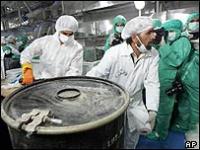







|
News and Information
Iran removes UN's nuclear seals
| August 10, 2005 |

Two technicians carry a box containing yellowcake at the Iranian nuclear facility at Isfahan
Iran says its nuclear programme is for purely peaceful purposes
Iran has broken all the remaining UN seals at its nuclear plant at Isfahan, making it fully operational.
The removal was completed under the supervision of the International Atomic Energy Agency, which has installed equipment to monitor activity.
The move came as members of the UN's nuclear watchdog held urgent private talks on Iran's decision to re-start uranium conversion activities.
The IAEA wants to persuade Iran to resume a voluntary suspension.
Mohammad Saeedi, deputy head of Iran's Atomic Energy Organisation, said: "The removal of seals has been completed. The plant is fully operational now."
Sanctions threat
The IAEA's 35-nation board postponed a second day of formal talks about Iran's move until Thursday, so that diplomats could continue discussing the issue privately behind closed doors.
Iran's new President, Mahmoud Ahmadinejad, has said he is ready for more talks on its nuclear programme and will put forward new proposals.
The US and the EU have urged Tehran to return to negotiations.
NUCLEAR FUEL CYCLE
Mined uranium ore is purified and reconstituted into solid form known as yellowcake
Yellowcake is converted into a gas by heating it to about 64C (147F)
Gas is fed through centrifuges, where its isotopes separate and process is repeated until uranium is enriched
Low-level enriched uranium is used for nuclear fuel
Highly enriched uranium can be used in nuclear weapons
In depth: Nuclear fuel cycle
Profile: The IAEA
They want Iran to abandon its scheme, which they suspect is a cover for a nuclear weapons programme, in exchange for political and economic concessions.
Iran suspended its nuclear programme in 2004 to allow for talks, but began work at Isfahan on Monday after rejecting the latest EU offer.
A suspension at its uranium enrichment facility in the city of Natanz remains in place, but officials say that could also change.
The IAEA is discussing whether Iran should be referred to the UN Security Council for sanctions.
The West could call for sanctions on the grounds that Iran hid its uranium enrichment programme for 18 years, without telling the IAEA. The UK representative at the agency, Peter Jenkins, told the BBC it was beginning to look as if Iran was not open to persuasion to halt activity.
'Deeply suspicious'
On Tuesday, Russia joined the mounting calls for Tehran to stop conversion work.
We are ready for talks, and negotiations have never been interrupted by us
Mahmoud Ahmadinejad
Iranian president
Timeline: Nuclear crisis
Iran's press defiant
Russia is Iran's main partner in its effort to develop nuclear power and is helping the state to build a nuclear reactor at Bushehr.
However, the foreign ministry said Tehran should halt activity and continue to work closely with the IAEA.
In the US, President George W Bush said Iran's willingness to return to talks was a "positive sign".
But he added he was still "deeply suspicious" that Iran was intent on developing a nuclear weapon.
Iran says it has the legal right under the Nuclear Non-Proliferation Treaty to carry out the nuclear fuel cycle.
The Isfahan plant is Iran's main uranium conversion facility. Conversion is an early stage in the nuclear fuel cycle, turning raw uranium - known as yellowcake - into the feedstock for enriched uranium.
Uranium enriched to a low level is used to produce nuclear fuel, while further enrichment makes it suitable for use in atomic weapons. |
Source: www.bbc.com |
| http://news.bbc.co.uk/2/hi/middle_east/4136662.stm |
|
| Support Caprivi Freedom |
Fill out the form below to become a member of this site and receive our regular newsletter.
|

|

